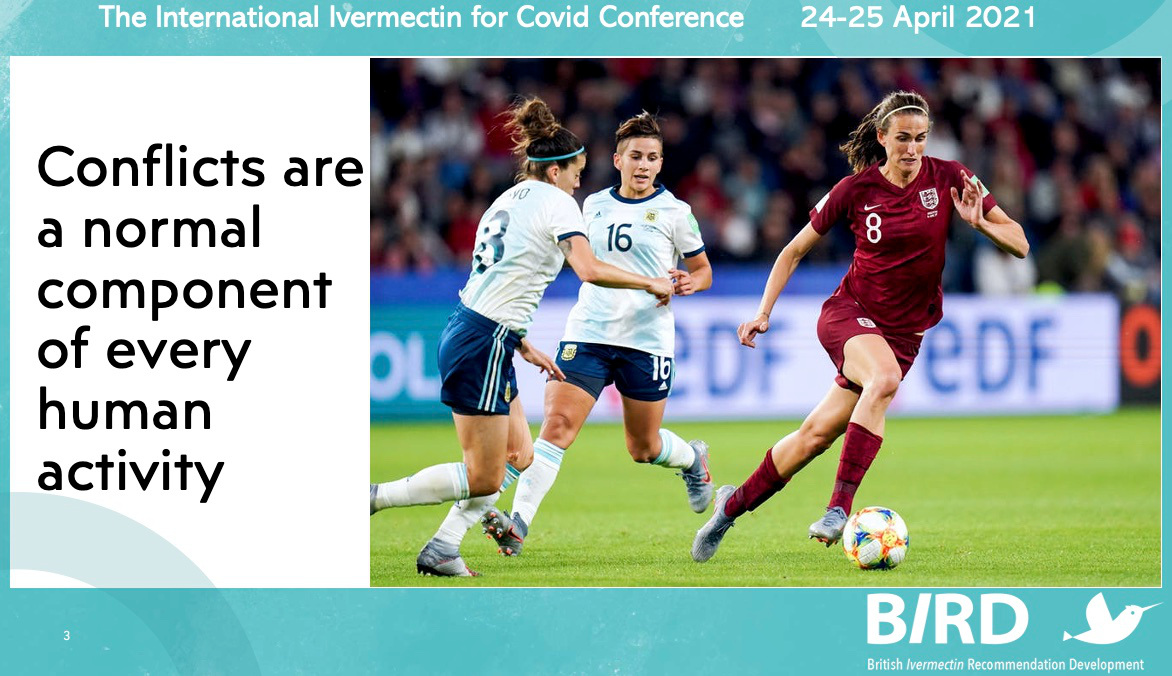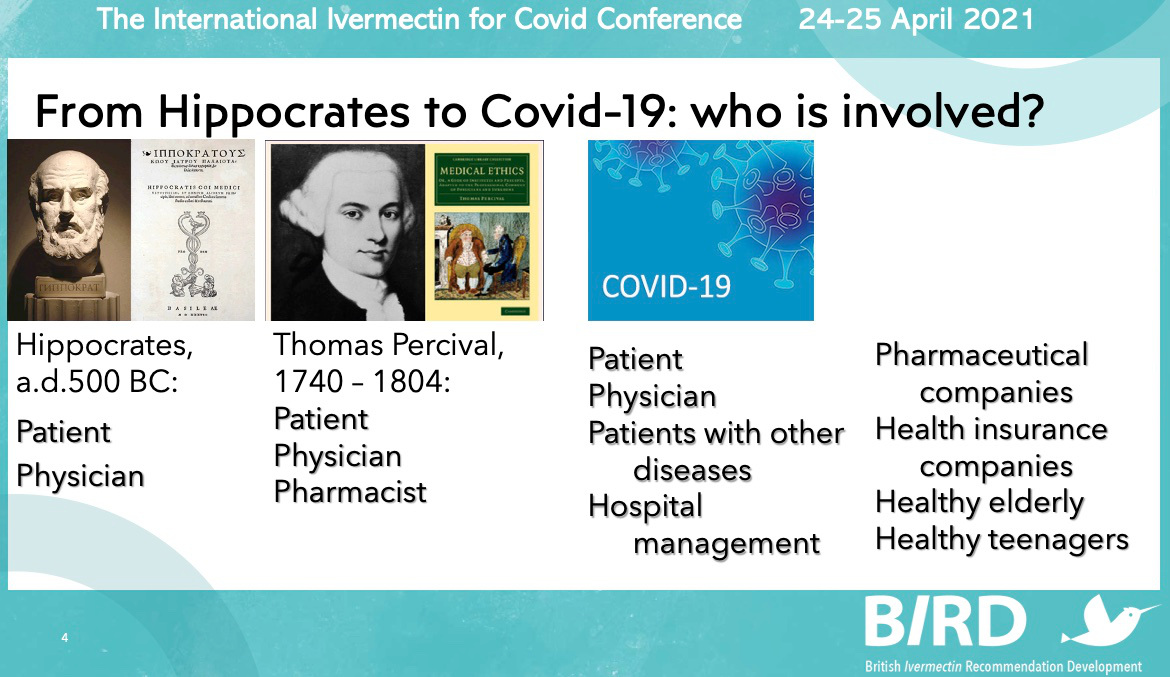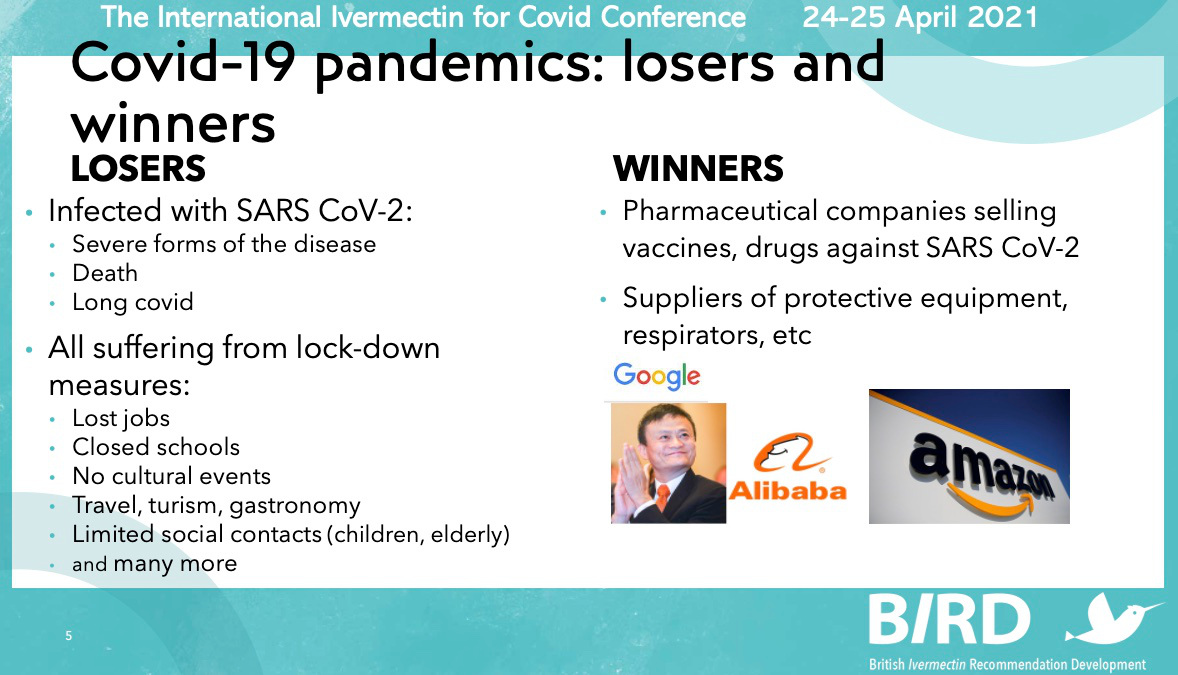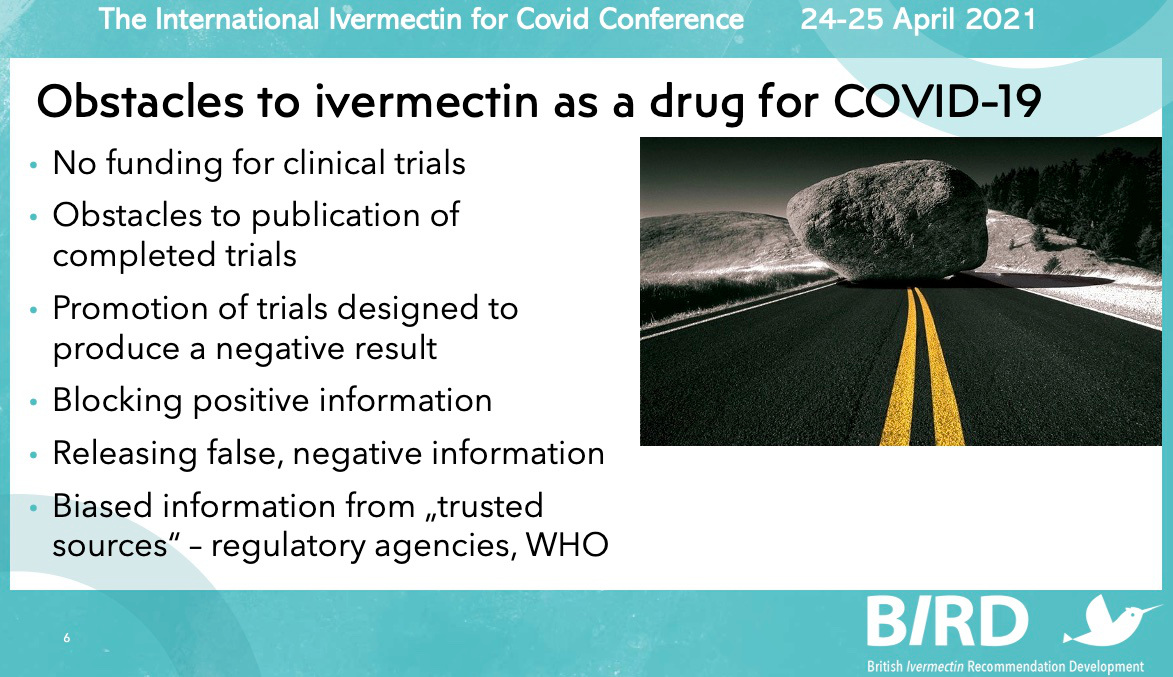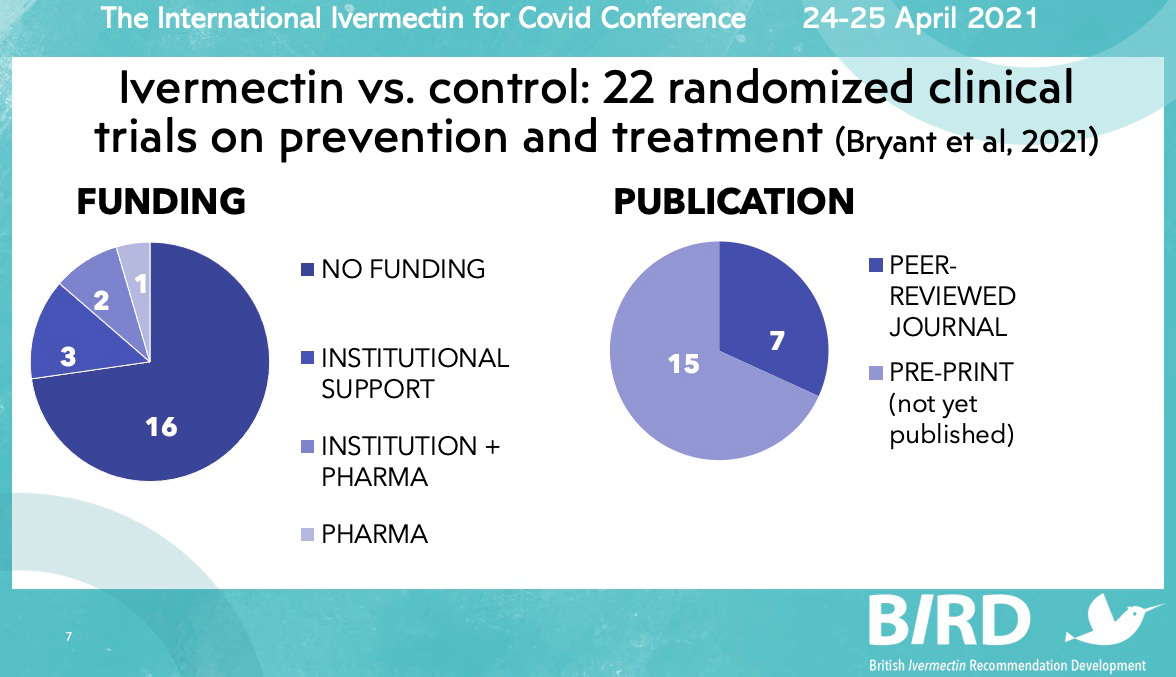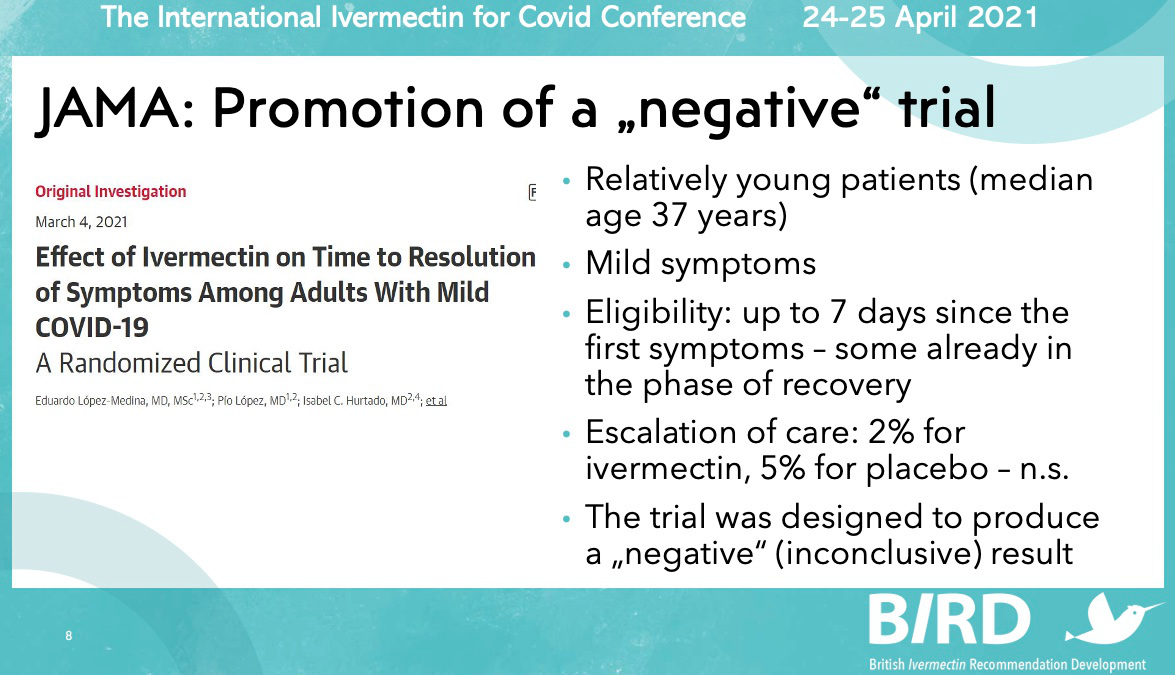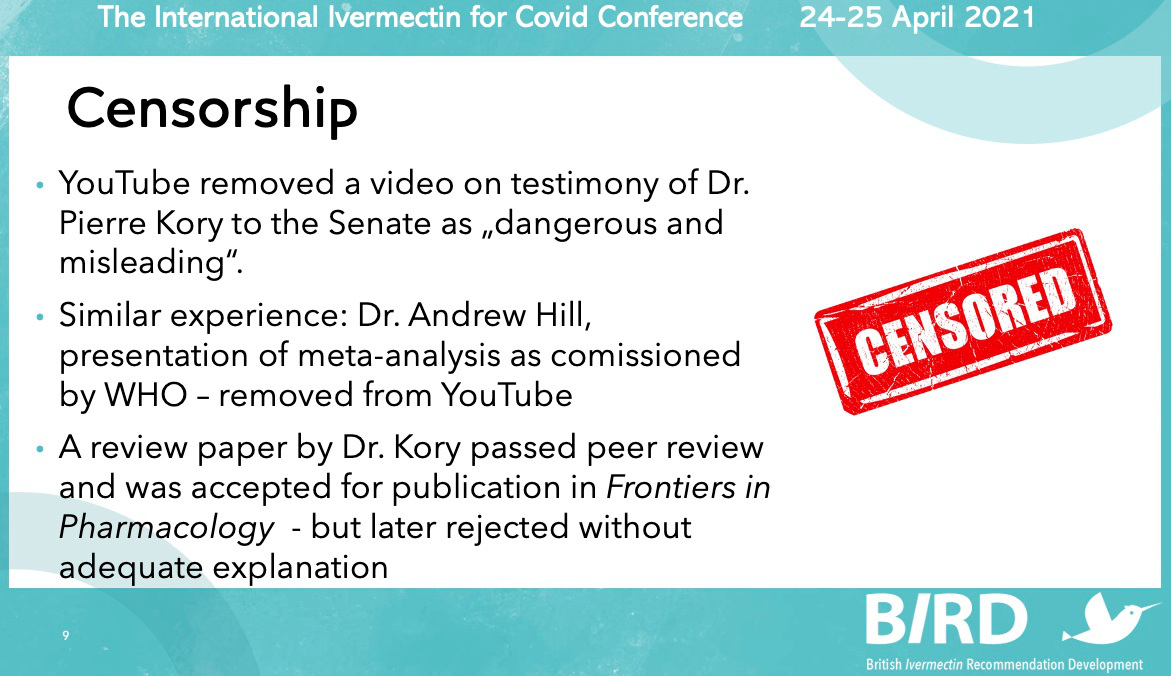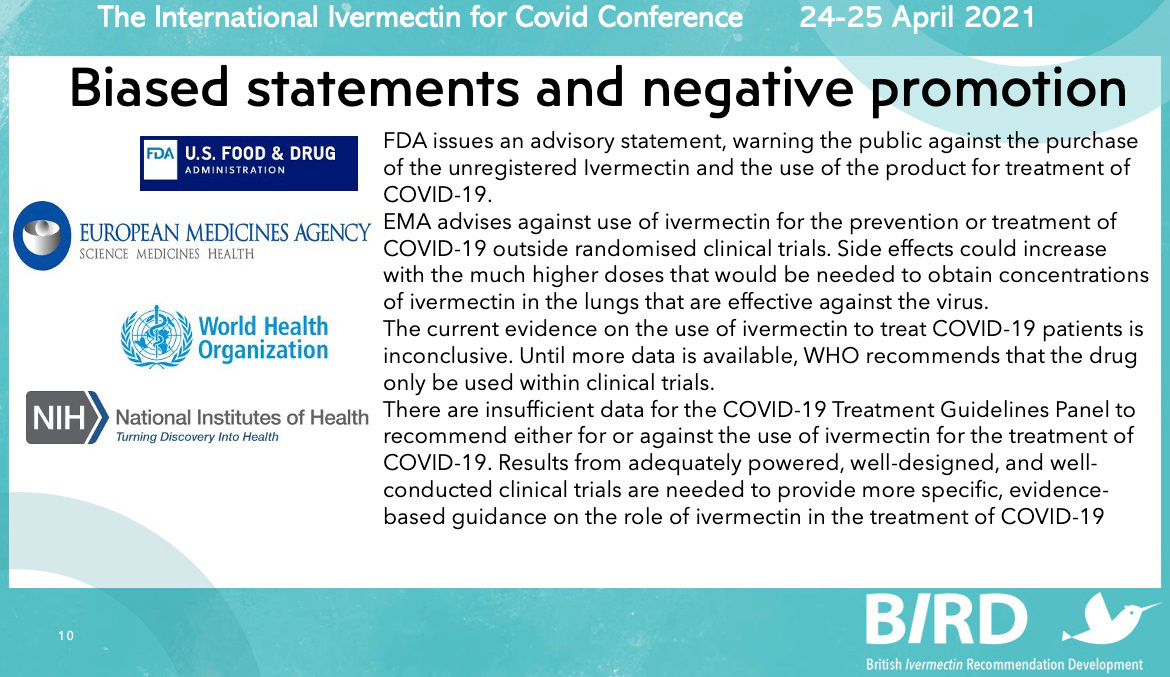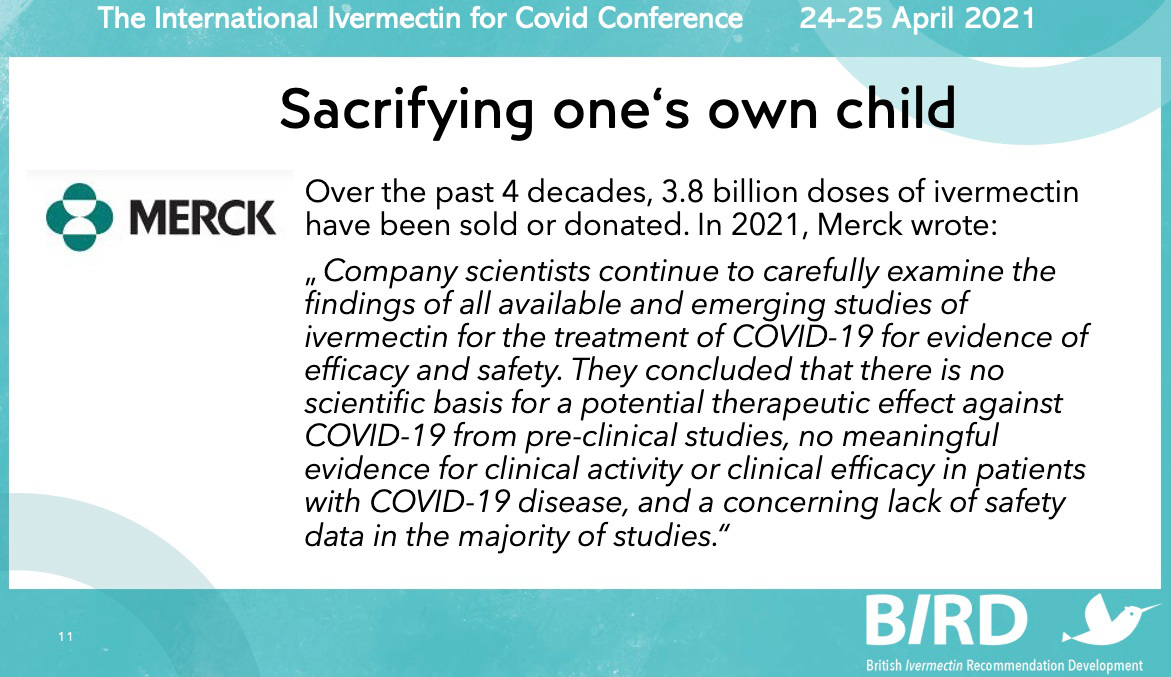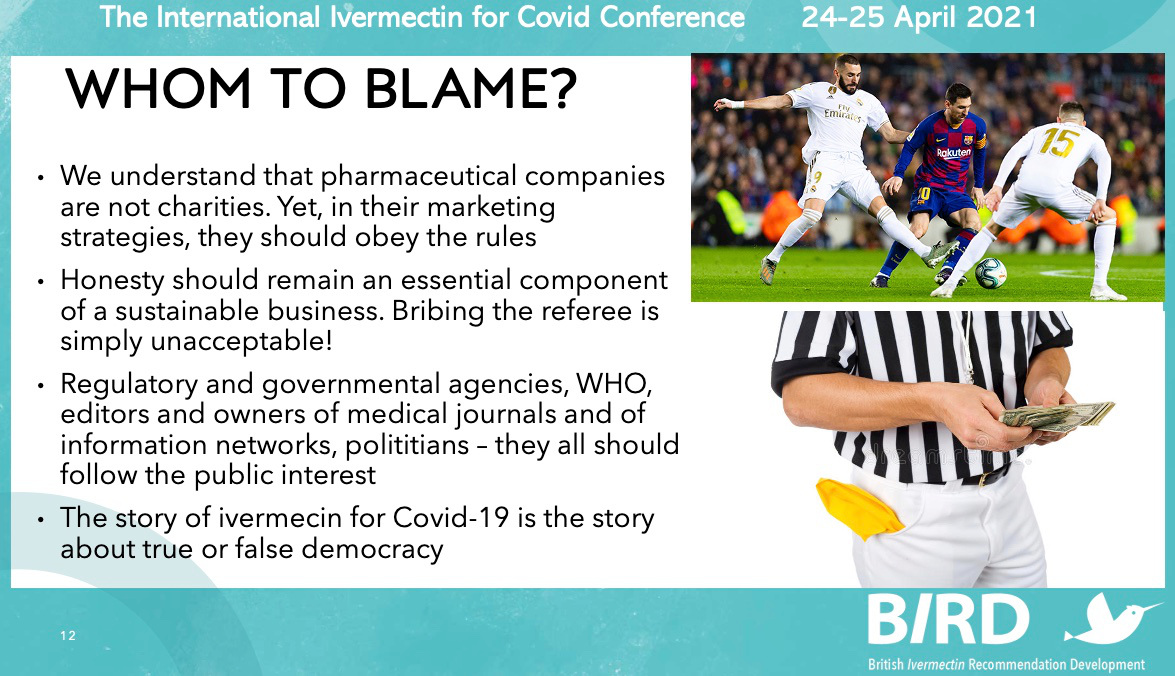- What is ivermectin and how does it work? (17:12) Overview by Dr Mobeen Syed.
- Ivermectin evidence update (32:42) Dr. Tess Lawrie presents the latest systematic review evidence from RCTs and a selection of resource, equity, acceptability and feasibility considerations related to ivm use.
- Real world data (39:03) Mr. Juan Chamie presents the latest real world data from countries using ivm, including the European data.
- Ongoing Trials (32:42) Mr. Andrew Bryant provides an overview of ongoing trials and what they may add to the evidence base.
- Ivermectin use in the elderly (32:18) Dr. David Chesler shares his experience of using ivm to prevent and treat covid-19 infection amongst care home residents.
- Recent findings from the Israeli trial of ivermectin versus placebo (29:54) Prof. Eli Schwartz shares data and conclusions from his Israeli RCT of ivermectin in mild to moderate covid-19.
- Protocols for prophylaxis and treatment of acute covid-19 (44:23) Dr Pierre Kory discusses current protocols for covid-19 prevention and treatment.
- Experiences with ivermectin in Bangladesh (28:20) Dr. Wasif Khan presents his published ivermectin trial and his experience with using ivm in Bangladesh.
- Experience with ivermectin and long covid in South America (27:57) Prof. Héctor Carvallo shares his experiences with using ivm for long covid.
- Experience treating long covid (29:16)
- Experiences of a frontline Infectious Diseases doctor in Scotland (17:11) Dr. Manjul Medhi shares his front line experiences in treating acute and long covid including using ivm in patients at risk of disseminated strongyloides infection.
- Medical Ethics and Ivermectin (27:57) Prof. Matjaž Zwitter, MD, PhD, presents current ethical issues around ivm for covid-19.
| From the two-page bird-group.org Join Our Campaign flyer: Covid-19 deaths and fear of the virus have paralysed the world, destroying lives and livelihoods. Yet, to date, remarkably few treatments have been identified and shared by global health authorities to reduce hospitalisations and deaths linked to the virus. In spite of this vacuum, many doctors have been quietly but successfully using a medicine called Ivermectin to treat people with covid-19. In the past year, the list of countries that use Ivermectin for the prevention and treatment of the virus has grown to include the Czech Republic, Bolivia, Honduras, Peru, Slovakia, South Africa, and Zimbabwe, among others. And based on the latest evidence, doctors and scientists are now calling for Ivermectin’s approval in every country of the world. Ivermectin is a medication that has been widely used for around forty years to treat parasitic infections in adults and children. It is considered safe and effective and is notable for its antiviral and anti-inflammatory properties. More than 3½ billion doses of Ivermectin have been given worldwide. It is included in the World Health Organization (WHO) Model List of Essential Medicines and in 2015 its discoverers won a Nobel Prize in Medicine for the drug. In December 2020, Dr Tess Lawrie, a medical doctor and researcher based in Bath, who is the Director and runs the Evidence-Based Medicine Consultancy (E-BMC), became interested in the Ivermectin story after having seen Dr Pierre Kory pleading while giving testimony in the United States Senate on Medical Response to COVID-19 to allow doctors to prescribe Ivermectin for use against the coronavirus. After examining the studies that Dr Kory referenced, Dr Lawrie and her team of experienced researchers at the E-BMC reviewed and assessed the evidence on Ivermectin for covid-19 and shared it widely in the UK and internationally. |
Prof. Matjaž Zwitter, MD, PhD is Head of the Department of Medical Ethics and Law, Medical Faculty, University of Maribor, Slovenia. His two papers on ivermectin for Covid-19, as published in Slovenian medical journal Isis and in leading newspaper Delo stirred a vivid debate among medical and lay community, hopefully leading to a change in current medical practice.
He was co-editor of two books on communication: Communication with the cancer patient: information and truth (The New York Academy of Sciences 1997) and New challenges in communication with cancer patients (Springer 2013). He also wrote and published three books: Talking about medical ethics (in Slovenian language, Cankarjeva zalozba 2018), Medical Ethics in Clinical Practice (Springer 2019) and Talking on euthanasia (in Slovenian language, Slovenska matica 2019).
After two long sessions and eleven excellent presentations, I have the privilege and the challenging task to give the last talk before Dr. Syed concludes our virtual meeting. While my basic speciality is oncology, my main activities now are teaching and research in medical ethics. I am most grateful to the organizers of this meeting, and especially to Dr Tess Lawrie for the invitation to speak about ethical issues in connection with the pandemic, and particularly on the role of ivermectin as a potential drug for covid-19.
Conflicts are a normal component of every human activity. Indeed, without conflicts, we would be like North Korea: a frozen society. Yet, it is essential that the rules for resolving conflicts are clear and are respected. A football game is a conflict of two teams. Both want to win: they engage the best coach and the best players, develop their strategies, and train hard. However, doping, or bribing the referee, or serving poisoned food to the opposite team are not allowed. Such activities would be illegal, and also deeply unethical.
In medicine, the situation with regard to ethics is more complicated. For Hippocrates, the physician and the patient were the only persons involved. In 1803 when Thomas Percival wrote his classical text on medical ethics, a third figure entered the stage: the pharmacist. Today, every activity in the field of health care, in one way or another, touches the interests of a wide spectrum of individuals or groups. In the case of Covid-19, a patient infected with this virus and his or her physician are clearly not the only persons involved. Patients with other diseases who may compete for the same resources, other physicians and health personel, hospital management, pharmaceutical companies, health insurance companies, healthy elderly persons, healthy teenagers, society as a whole – they all have their legitimate interests. These interests do not overlap, and may come in conflict, one against the other. The covid pandemic put the spotlight on these conflicting interests.
After every significant crisis in human history, we see losers and winners. In every war, thousands or millions of people lost their life or their property, while for some other individuals, groups, or nations, the crisis brought an opportunity to increase their wealth, influence, or power. The same is true for the covid-19 pandemic. Those who died of the disease or have health consequences due to long covid are numerically speaking a small proportion of the overall number of people affected by the pandemic. Millions of other people feel indirect consequences of the health crisis. Lockdown measures, as imposed by most governments, led to severe restrictions in most areas of our societies. A list of problems and tragedies due to lockdown measures is almost endless, and so is the list of groups of our citizens who were severely hurt in their essential interests. Young people suffer from the limits in their education and social activities, athletes from limits in training and competition, millions of people lost their jobs, many thousands of small companies had to close their business and were sold for almost nothing. The consequences of this global health crisis are not temporary. For society as a whole, the economic consequences of the crisis will be felt for many years.
At the same time, for some segments of our societies, the health crisis brought an opportunity to increase their power and wealth. The first on the list are pharmaceutical companies, especially those involved in the production of vaccines and anti-viral drugs. A significant shift of public activities to virtual events, meetings and education means a fortune for all connected to the growing business of computers, information and media technology. Due to marked increase in on-line shopping, Amazon and Alibaba are making fantastic revenues. And while for a significant part of the population the prospects are grim and many are forced to close their business or even sell their personal property, those who made profit from the crisis have the opportunity to buy it for only a fraction of the real value.
In brief: this crisis, as any significant societal crisis in the past, leads to a marked turnover on the ladder of the economic, social and political power. This holds true on an individual level, on the level of particular groups within a society, and on the global level as a shift in power of nations.
As we saw during these two days, ivermectin appears to be a safe and affordable means to end this pandemic. Yet, every effort has been made to prevent the implementation of ivermectin as prophylaxis and treatment for Covid-19 in the majority of countries.
In clinical research, some costs are inevitable. The sponsor is supposed to cover costs for the drugs, for additional diagnostics, and for the staff in charge of patient registration, randomisation, data collection, and analysis. In their recent meta-analysis, Bryant, Lawrie and their collaborators presented a list of 22 clinical trials of prevention and treatment of Covid-19 with randomization between ivermectin and a control group. Of these trials, only 3 received funding from pharmaceutical companies, and additional 3 were partly funded by institution. Sixteen trials, or 73% received no financial support and pursued their idea solely on altruistic basis. Then, after completing their trial, many of the authors faced another obstacle: publication. Among the 22 trials, only 7, or 32% have been published in peer-reviewed journals. Replying to a survey mailed by Dr. Lawrie, many of them wrote that a manuscript was returned without any editorial comment or proper review. It is hard to avoid a feeling that for some editors, »ivermectin for Covid-19« is a prohibited topic.
While many authors of reports on ivermectin for covid were turned down, the prestigious Journal of the American Medical Association, JAMA, published a trial from Colombia. It is difficult to understand why the authors decided to give either ivermectin or placebo to an ambulatory population of relatively young patients, of whom many were already in the phase of recovery, unless we suppose that the trial was designed with a clear aim of producing a negative result. This trial was probably funded by pharmaceutical companies.
We all know about the experience of Dr. Kory with his presentation to the Congress which was recorded on YouTube and soon afterwards erased. His review paper on ivermectin for Covid-19 passed through peer review and was accepted for publication in Frontiers in Pharmacology. After a few weeks, Dr. Kory got a message from the editor that the paper was rejected. Dr. Andrew Hill had a similar experience: his report to WHO on meta-analysis of ivermectin against covid-19 on YouTube was quickly removed, presumably due to »dangerous and misleading information«. His paper was published but edited without his consent, adding sentences which grossly dilute the message. In a democratic society, such cases of censorship are simply unacceptable.
Without exception, all drugs used to treat patients with covid-19 have weaker evidence of efficacy and are more toxic, when compared to ivermectin. Yet, no other drug has received a comparable negative promotion. Food and Drug Administration, FDA, is warning the public against the purchase of the unregistered Ivermectin and the use of the product for treatment of COVID-19. European Medicines Agency, EMA, advises against use of ivermectin for the prevention or treatment of COVID-19 outside randomised clinical trials. Furthermore, they warn that side effects could increase with the much higher doses that would be needed to obtain concentrations of ivermectin in the lungs that are effective against the virus. According to World Health Organization, WHO, the current evidence on the use of ivermectin to treat COVID-19 patients is inconclusive. Until more data is available, WHO recommends that the drug only be used within clinical trials. The Panel at the National Institute of Health, NIH, wrote that there are insufficient data to recommend either for or against the use of ivermectin for the treatment of COVID-19. Results from adequately powered, well-designed, and well-conducted clinical trials are needed to provide more specific, evidence-based guidance on the role of ivermectin in the treatment of COVID-19.
Finally, we have Merck, the company which sold or donated 3.8 billion of doses of ivermectin over the past four decades. Merck stated that company scientists continue to carefully examine the findings of all available and emerging studies of ivermectin for the treatment of COVID-19 for evidence of efficacy and safety. These company scientists concluded that there is no scientific basis for a potential therapeutic effect against COVID-19 from pre-clinical studies, no meaningful evidence for clinical activity or clinical efficacy in patients with COVID-19 disease, and a concerning lack of safety data in the majority of studies.
No funding for clinical trials, refusal to publish results of many observational and randomized trials, unprecedented blockade to publish results of review papers and meta-analyses, censorship of presentations on social media such as YouTube, unfavourable and biased statements by agencies such as FDA and EMA, as well as by WHO and Merck, the producer of ivermectin. Needless to say, repeated warnings on the presumed dangers, side effects and serious harm of ivermectin are totally false.
Should we blame only the pharmaceutical companies? I don’t think so. As I said in the beginning, diverging interests are acceptable, so long as the players stick to the rules. We all know that pharmaceutical companies primarily follow their commercial interests. Their slogans such as patients’ interests are our priority do not reflect their marketing strategies. To blame pharmaceutical companies for such a policy may lead to ethical puritanism. We do understand that they are not charities, and that they go for profit. What is to blame, however, is that pharmaceutical companies are using channels other than usual marketing in order to pursue their goals. Influence upon information networks, on medical journals, on regulatory agencies, and on WHO as a prima facie defendant of the public rather than commercial interest, and possibly even on governments – all this is deeply unethical. The same holds true for sponsorship of trials designed to spread biased experience. Such activities are very much like bribery of the referree in a football game. We know that football is not only a game; it is also a big business. But nevertheless, the game has to stick to the rules. If we accept the bribery of football then all the excitement of the Champions League is lost. And, back to medicine, all the enthusiasm of doctors and nurses who are doing their best to save lives of their patients is lost in case they are not allowed to use the drugs which they consider most appropriate.
In conclusion, the story of ivermectin which we have been discussing these two days is only a small piece in the puzzle of current pandemics. Yet, this story is a classical example on what happens if the rules are not respected. In a democratic society, our governments and public agencies should defend the rules and stand behind the public interest. The story of ivermectin is therefore also the story about true or false democracy.
Comments and questions begin at 17:31.
